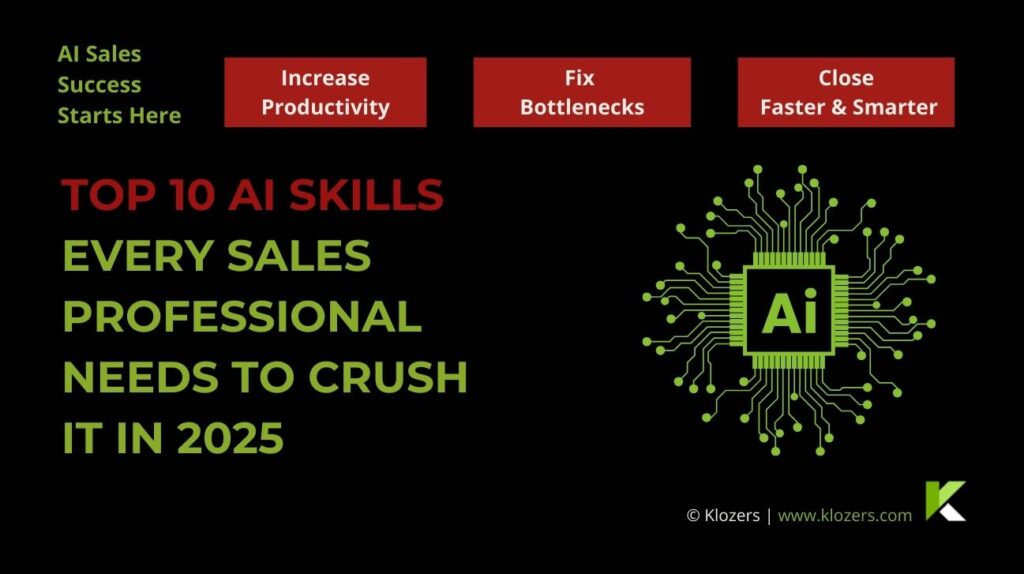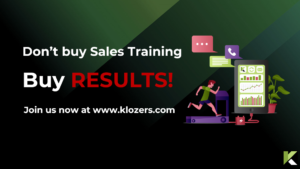AI SKILLs - Top Question FRom Google
What are the most important AI skills sales professionals need to stay competitive in 2025?
Sales in 2025 will be defined by how well professionals can combine human expertise with AI capability. Buyers expect speed, precision, and personalisation that simply can’t be delivered through traditional selling methods alone. That’s why mastering the right AI skills is no longer optional: it’s the difference between hitting quota and being left behind. In this guide, we’ll break down the top 10 AI skills every sales professional should focus on, how they translate into day-to-day results, and which tools can help you get there faster.
Free access to our best tools and templates
Introduction: Top 10 AI Skills Every Sales Professional Needs
Artificial intelligence isn’t just a trendy topic anymore; it’s a must-have strategic tool for every business.
And nowhere is this more evident than in B2B sales, where the pressure to work faster, personalise more deeply, and forecast more accurately is relentless.
If you’re a sales professional or revenue leader, it’s no longer enough to rely on charm, product knowledge, or relationship-building alone. The most successful salespeople today are blending those traditional skills with AI capabilities to gain a competitive edge.
Buyers are savvier, entire sales cycles are tighter, and the amount of sales and customer data available is staggering. AI helps make sense of this modern sales landscape.
AI can make your job easier and your results stronger, whether you’re a business development rep sending dozens of outreach emails daily, an account executive managing multi-stakeholder deals, or a sales manager coaching a remote team.
In this article, we’ll explore exactly how B2B sales teams can leverage AI, the top 10 AI skills you’ll need in 2025, the real-world benefits of acquiring these skills, and a rundown of the AI tools and technologies reshaping sales as we know it.
How your sales team can leverage AI
The smartest B2B sales organisations aren’t just experimenting with AI, they’re integrating it into the core of their growth and sales strategies.
Rather than treating AI as a set of disconnected tools, they’re using it to transform how they find opportunities, engage prospects, and drive sales performance at scale.
When AI is mentioned in sales, the conversation often jumps straight to tools. However, the true opportunity lies in transforming workflows. AI empowers sales teams to do more of what works and less of what doesn’t.
Here are some of the key ways B2B sales teams are harnessing AI:
Smarter Sales Prospecting
AI can crawl company websites, scan job boards, and even monitor funding news to identify new prospects or trigger events worth pursuing. Rather than spending hours trawling LinkedIn or databases, sales reps can use AI tools to generate targeted lead lists in minutes.
AI Powered Opportunity Identification
Top-performing sales teams are using AI to uncover new sources of revenue, both in their core markets and in emerging segments.
Analysing customer behaviour, purchase history, and market signals helps sales professionals spot untapped potential that might otherwise be missed.
AI can help identify dormant accounts with renewed interest or flag cross-sell opportunities, bringing precision to opportunity discovery.
Personal Outreach At Scale
Sales innovators are leveraging generative AI to tailor offerings and outreach to increasingly niche customer needs. No more one-size-fits-all messaging.
AI enables reps to craft communications that speak directly to the buyer’s role, industry, business pain points, and intent, resulting in higher engagement and trust from the first touchpoint.
Combined with human review and contextual adjustments, this enables scalable yet authentic outreach.
Value-based, AI-enabled pricing
Gone are the days of flat pricing models and guesswork. With AI, companies are leveraging advanced data analysis and machine learning tools to shift toward dynamic, value-based pricing that adjusts based on customer segment, buying context, and perceived value.
This not only sharpens pricing discipline but also gives sellers more confidence in structuring deals that align with customer preferences and business objectives.
Digitally enabled task automation
AI is a powerful tool for freeing up sellers’ time to focus on relationship-building and closing deals.
From prioritising leads and scheduling follow-ups to summarising meetings and drafting proposals, task automation powered by AI allows sellers to deliver value more quickly and consistently.
It also helps teams build better sales and marketing alignment and sync together day-to-day activities with AI-powered sales strategies.
Meeting Intelligence & Coaching
Sales calls are full of insight if you know where to look. Tools like Gong and Chorus use AI to analyse meetings, flag competitive mentions, and highlight talk-to-listen ratios. Sales managers no longer need to manually review recordings to coach their team effectively.
Pipeline & Forecasting Accuracy
By analysing patterns across deals, AI can highlight which opportunities are most likely to close and which are at risk. This helps sales leaders provide more accurate forecasts, identify red flags early, and better allocate resources.
Data Driven Talent Development
Sales organisations are also using AI to improve how they assess and develop talent. Performance data can now be analysed in real time, revealing which behaviours lead to sales success and where coaching is needed.
AI also supports capability-building at scale, delivering personalised learning paths and targeted feedback that continuously improve seller and sales effectiveness.
At Klozers, our AI training for sales reps goes beyond theory. We help B2B teams embed AI into their sales processes without disrupting what already works.
Top AI skills for sales professionals in 2025
Mastering AI in sales doesn’t mean becoming a data scientist. It means acquiring practical, job-relevant, and human skills that align with how sales is done today.
Here are the 10 most valuable AI skills for sales professionals in 2025:
1. Prompt Engineering
Crafting effective prompts is key to generating useful outputs from AI tools. The best sales reps will know how to structure prompts to get nuanced and contextually relevant responses.
Example: Instead of typing “write a follow-up email,” a well-crafted prompt might be: “Write a concise, friendly follow-up email to a marketing manager at a B2B SaaS company who expressed mild interest in a demo last week but hasn’t replied.”
2. AI-aided research and insight gathering
Sales professionals must know how to use AI to gather valuable insights about accounts, market trends, and competitor activity. Tools like ChatGPT, Apollo, and LinkedIn Sales Navigator (with AI overlays) allow for rapid, surface-level and deeper research.
3. AI-enhanced email writing and sequencing
While anyone can generate an email with AI, few can fine-tune it into a message that gets opened, read, and replied to. Skill lies in editing for tone, clarity, and value, while maintaining personalisation and professionalism.
4. AI-driven task management and workflow optimisation
AI won’t replace salespeople, but those who can delegate low-value tasks to automation will have a major edge. Sales professionals must learn how to integrate AI tools into their daily routines to automate admin tasks, generate follow-up actions from meetings, and maintain clean, accurate CRM data.
5. Customising sales collateral with AI
Whether it’s a proposal, case study, or slide deck, AI tools like Canva AI, ChatGPT, or Beautiful.ai can generate or assist in tailoring content for specific clients, thus saving time and making it contextually relevant to each client and their needs.
6. Simulating sales scenarios with AI
Salespeople can use AI to roleplay challenging conversations or practice objection handling in private. This allows for skill development in a low-pressure environment and with real-world examples before stepping into high-stakes meetings.
7. Analysing conversational data
Reps and managers should learn how to review and interpret the insights surfaced by conversation intelligence tools: keyword frequency, objection patterns, competitor mentions, and buyer sentiment trends.
8. Forecasting and deal risk assessment
Understanding how AI models flag deal risks, perhaps due to buyer inactivity, weak multi-threading, or poor timing, enables reps to take pre-emptive action to re-engage or reposition.
9. Fluency in sales tech stack
Reps don’t need to be IT experts, but they should be comfortable using AI-driven tools inside the CRM or enablement platform. This includes configuring email cadences, running AI-assisted reporting, or setting up alerts.
10. Ethical AI
AI should enhance trust, not erode it. Sales professionals need a strong grasp of where AI fits and where it doesn’t, ensuring privacy, compliance, and transparency in all sales operations.

Benefits of AI skills for sales professionals
Sales teams that are equipped to use AI effectively don’t just work faster, they work smarter, with greater precision and impact across every stage of the funnel.
Here’s what businesses typically gain when their salespeople are trained to harness AI:
- Increased sales productivity with AI: By automating time-consuming admin and repetitive tasks, AI frees up reps to focus on what really matters: engaging prospects and closing deals.
- Shorter sales cycles: AI accelerates research, sharpens messaging, and improves buyer targeting, enabling sales conversations to progress faster and more efficiently.
- Higher win rates: Personalised outreach, real-time objection handling, and data-backed follow-ups give reps the edge needed to convert more opportunities into wins.
- Smarter coaching and performance development: With AI-generated insights from calls, emails, and CRM activity, sales leaders can deliver targeted, real-time coaching that directly improves individual and team performance.
- Greater commercial agility: Teams become more responsive to shifts in buyer behaviour and market dynamics, using AI to adapt messaging, reprioritise efforts, and seize emerging opportunities without delay.
At Klozers, we focus not just on introducing new tools but on developing the skills and confidence your team needs to turn those tools into measurable outcomes.
Types of generative AI used in sales
Different types of generative AI are utilised at various stages of the sales funnel, each delivering value in distinct ways. They include:
- Text generation: Used for crafting AI-powered outreach emails, LinkedIn messages, call scripts, and value propositions. Text-based AI is the most widely adopted in sales today.
- Speech and voice analysis: AI tools analyse sales calls for sentiment, talk ratios, filler words, and buying signals, transforming conversation data into coaching opportunities.
- Image and visual content: Used to quickly generate visuals for sales decks, social media posts, or case studies, particularly valuable for BDRs who work closely with marketing.
- Multimodal AI: The next frontier, combining voice, text, and visual AI. Tools like Fireflies, Zoom AI Companion, and Microsoft Copilot are beginning to offer integrated sales support across formats.
Top generative AI tools for sales teams in 2025
Here’s a curated list of some of the best AI tools for sales teams in 2025:
- Gong: For real-time call intelligence, deal tracking, and rep coaching based on actual conversations.
- ChatGPT Enterprise: Customisable AI chatbots used for drafting emails, summarising content, and brainstorming ideas.
- Lavender: Enhances cold email writing with AI-driven scoring, tone correction, and personalisation tips.
- Salesforce Einstein: Native AI embedded in Salesforce, supporting lead scoring with AI, opportunity insights, and sales analytics.
- HubSpot AI: Offers predictive lead scoring, content generation, and AI-powered chatbots that are ideal for SMEs.
- Apollo AI: Combines prospecting and outreach tools with intelligent lead recommendations.
- Fireflies: Transcribes meetings and provides searchable, shareable notes with AI-driven highlights.
- Pipedrive: AI sales assistant.
These sales AI tools are only as powerful as the humans behind them. That’s why at Klozers, our AI Skills for Sales course focuses on sales techniques and skills before software, ensuring teams get the most out of every tool they use.
ACTIONABLE TIP
Start practicing prompt engineering today. Take one AI tool you already use, whether it’s ChatGPT, Salesforce Einstein, or Apollo, and experiment with writing more specific prompts for a single task like follow-up emails. Track which versions get higher open or reply rates. Small daily tests will sharpen your AI prompting skill and translate directly into better sales outcomes.
Takeaway: Master these 10 AI skills to outsell the competition in 2025
2025 won’t reward sales teams that dabble in AI. It will reward those who embed it into their culture, sales training, and everyday workflows.
Your team doesn’t need to be tech geniuses; they need to be curious, coachable, and empowered.
Investing in AI fluency today will yield better engagement, more conversions, faster onboarding, and stronger forecasting. But above all, it will futureproof your sales team in an increasingly competitive, AI-enhanced marketplace.
At Klozers, we’re helping forward-thinking sales teams across sectors turn AI into a competitive advantage. Through tailored workshops, executive coaching, and practical sales enablement, we’ll help your team develop the AI skills that drive results.
Do you want to unlock your team’s full potential with AI? Explore our AI Sales Skills Training and Coaching Programmes today.
FAQ's AI Skills
Here are the answers to some common questions about AI in sales:
How can AI help with finding and closing leads
AI identifies promising leads by analysing behaviour, demographics, and buying intent. It helps sales teams prioritise outreach, personalise messaging, and suggest next steps. This makes prospecting more efficient and improves close rates by enabling reps to engage the right people with the right message at the right time.
What is prompt engineering, and how does it apply in sales?
Prompt engineering involves crafting clear, specific instructions to get better results from AI tools. In sales, it helps reps generate personalised emails, summarise meetings, or simulate objections. Strong prompts save time and improve content quality, making AI a more reliable assistant in everyday sales activities.
Will AI replace sales reps, or just support them?
AI supports and will most likely not outrightly replace sales reps. It handles repetitive tasks and surfaces useful insights, freeing up time for reps to focus on building relationships and closing deals. Those who embrace AI will have a thriving sales career; those who ignore it may fall behind as tech-savvy peers outperform them using smarter tools.
What soft skills still matter when using AI in sales?
When using AI, sales reps must apply critical thinking to interpret data and question AI-generated suggestions. Adaptability is also key to mastering new tools and workflows, turning AI insights into strategic digital selling techniques and personalised customer engagement and human-led conversations that build trust.
Can AI make sales feel less personal?
AI can feel impersonal if overused or poorly implemented. However, when used effectively, it enhances personalisation by providing deeper insights into each prospect. The key is combining AI efficiency with human empathy, ensuring customer interactions are relevant, timely, and aligned with each customer’s specific needs.
What tools are best for automating sales tasks with AI?
Top tools include Gong for call analysis, ChatGPT for content creation, Apollo.io, an AI tool for lead generation, and Salesforce Einstein for pipeline insights and CRM automation. These platforms help reps automate routine work, stay organised, and engage and understand customers more effectively, so they can focus on data-driven selling.
.







